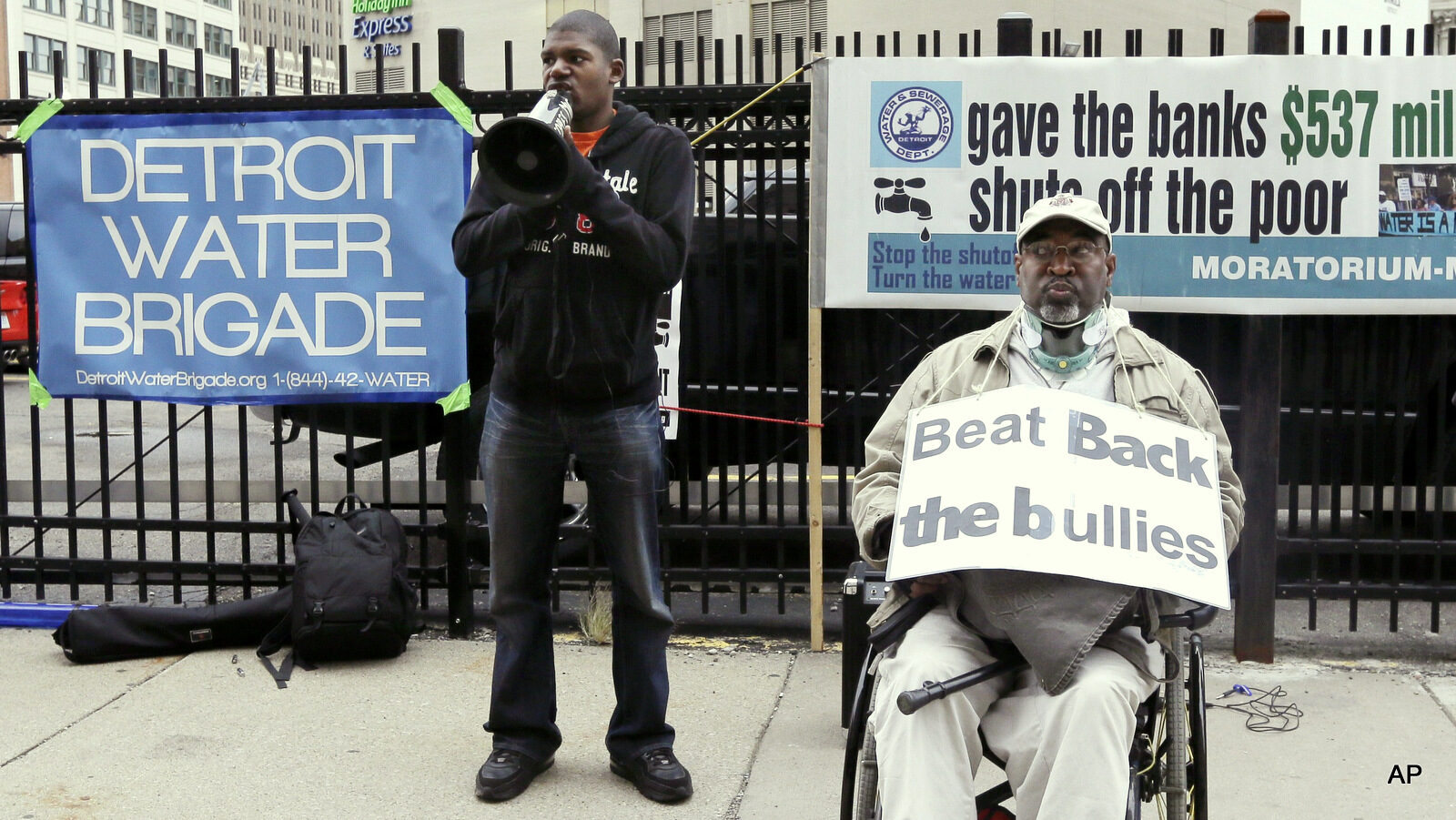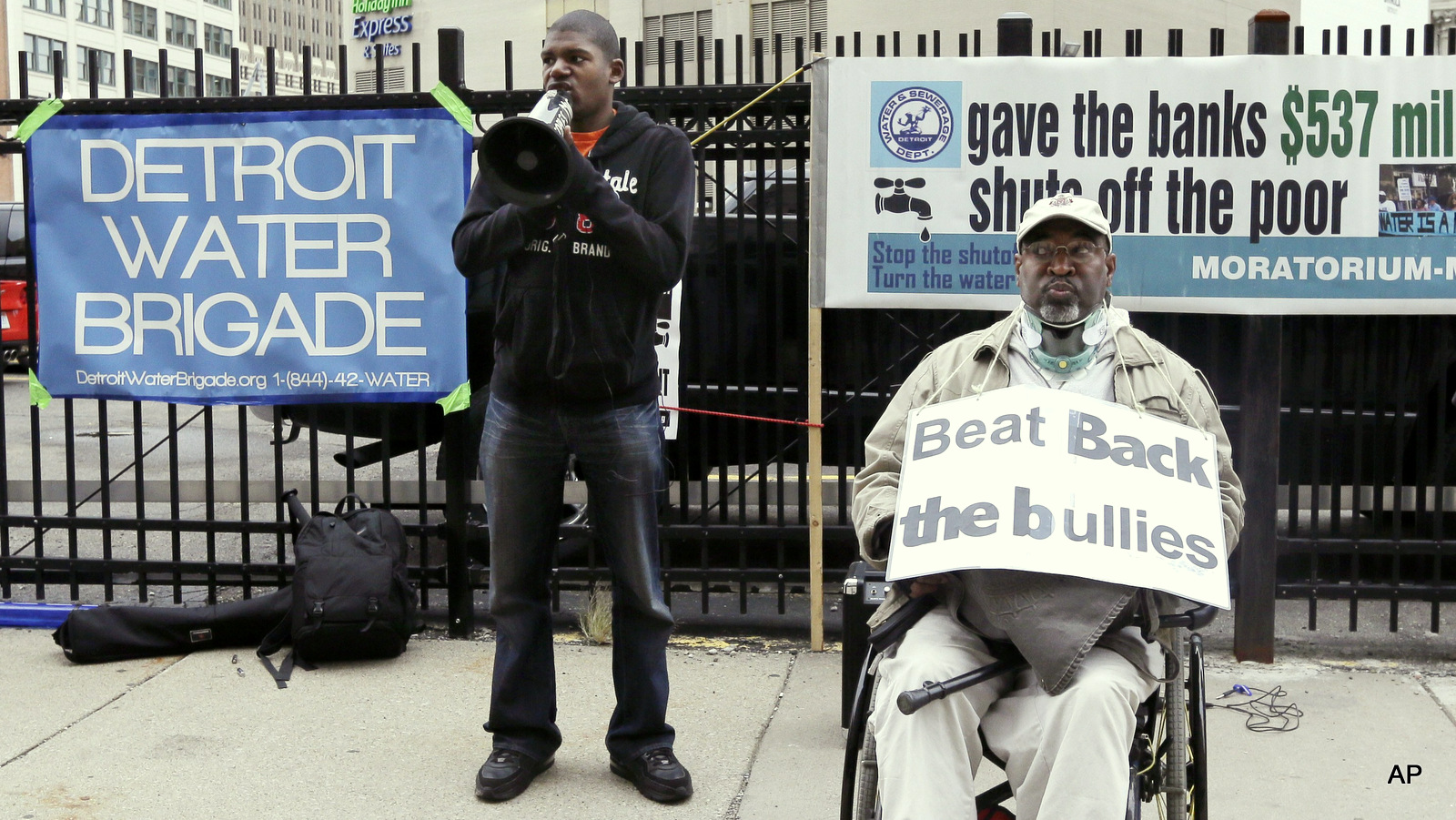
Editor’s Note: This article is Part I in a special series of MintPress exclusives from Detroit. Part II investigates how some Detroit citizens are taking action to police their own communities as a result of the lackluster efforts made by local police, it can found here. Part III will investigate how members of the Detroit community are working to maintain a sense of normalcy and rejuvenate the once thriving city.
DETROIT — A group of children play were playing outside of the House of Help Community Center, near the Five Points neighborhood in Detroit, earlier this month. Pizza and hot dogs were being served as a man’s voice broke through a speaker, reminding everyone that lunch was nearly over. It was time to get back to gardening and cleaning the streets.
The afternoon’s event was advertised as a “Neighborhood Cleanup and Barbecue Party,” a chance to help board up abandoned homes, pick up trash, and meet special guest, DeAndre Levy, a linebacker for the Detroit Lions. The event was organized by the Detroit Water Brigade, a volunteer activist alliance that formed in June 2014 to provide emergency relief to families without water and those facing imminent water shut-offs.
“We are going to make Detroiters stand up. Because when Detroit stands up, the whole country will stand up,” DeMeeko Williams, co-founder of the Detroit Water Brigade, told MintPress News.
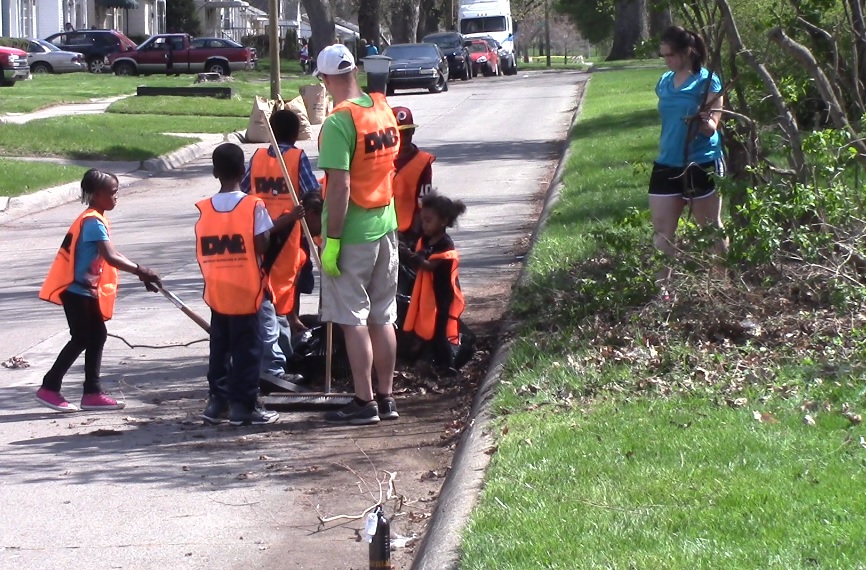 Volunteers with the Detroit Water Brigade cleaning up the streets of Detroit. Photo: Derrikck Broze/MPN
Volunteers with the Detroit Water Brigade cleaning up the streets of Detroit. Photo: Derrikck Broze/MPN
The shut-offs are one result of the city struggling to navigate a number of crises related to a deep economic downturn. Since the city filed for bankruptcy in 2013 there has been a shift from government-owned services to privately owned services. Trash collection is one of several services now offered by private companies, and water and sewage may be the next services headed for privatization.
Detroit experienced massive economic growth from 1910 through the 1940s, when the city thrived on an abundance of industrial and auto factory jobs. In the 1950s and 60s, however, the factories started to leave the city. As job opportunities dwindled, so did the population of Detroit — it fell from nearly 2 million people in 1950 to under 750,000 in 2010.
Today, much of the remaining population struggles to pay both rent and bills for utilities like water and electricity. This has led to tens of thousands of people owing money to the city for water and sewage.
In response to the overwhelming debt, the Detroit Water and Sewerage Department opted to begin turning off water to homes with bills in arrears.
In April 2014, the City of Detroit Water and Sewerage Department announced it would be disconnecting 140,000 residents from their water services. Led by bankruptcy attorney Kevyn Orr, the city shut off water services to homes owing $150 or more to the department. The disconnections were hitting up to 3,000 a week by June. The Detroit Free Press reported in March last year that 150,806 of the 323,900 DWSD accounts in Detroit were behind on their water bills.
The decision to disconnect the water to Detroit’s remaining residents stirred controversy both at home and abroad, leading to questions about corporatization and whether access to water is a basic human right.
The corporate colonization of Detroit
DeMeeko Williams, co-founder, political director and chief coordinator of the Detroit Water Brigade, is one of the many people affected by the water shut-offs who decided to take action. Williams has taken an active role in spreading the group’s message to the media. He’s also put his body on the line as part of blockades to physically stop the Homrich Inc. trucks tasked with disconnecting residents’ water.
“The ‘Water Warriors’ put their bodies on the line to protect Detroiters. Five hundred shut-offs were prevented,” Williams told MintPress.
The group also focuses on providing relief in the form of community water deliveries and pushing the city to stand behind a Water Affordability Plan that was passed in 2005 and ended in 2010, as part of what Williams calls “the corporate colonization of Detroit.” The Water Brigade is taking on “corporate titans,” who are working to privatize the water — a move Williams says would be disastrous.
The Water Brigade has been successful in turning Detroit’s water shut-offs into an international story. By the end of June 2014, three experts from the United Nations had condemned Detroit for the disconnections. “Disconnections due to non-payment are only permissible if it can be shown that the resident is able to pay but is not paying,” said Catarina de Albuquerque, the U.N. expert on the human right to water and sanitation.
Leilani Farha, the body’s expert on the right to adequate housing, also warned that children might be at risk of being removed from their families by social services officials because their homes are not considered adequate without access to water. Both Farha and de Albuquerque expressed concerns about the water shut-offs disproportionately affecting Detroit’s black population.
Williams says the Water Brigade and other groups have helped make progress. “Our model is being used around the country. We have also been to Ireland testifying to their parliament about our experiences,” he told MintPress. Listing examples of the group’s successes, Williams says the Water Brigade has helped return control of the water system to municipal control, expanded payment plans, helped lower down payments, and helped to achieve forgiveness on past-due balances.
Despite the international solidarity and press, the city has been victorious in pursuing its policy of shutting off the water to thousands of Detroiters. In September 2014, following a short-lived victory and a moratorium on the disconnections, U.S. Bankruptcy Judge Steven Rhodes ruled that Detroit could continue shutting off the water, arguing that his court did not have jurisdiction on the issue and a six-month moratorium on the practice might hurt the city’s pocketbook.
One of the major complaints voiced by the Water Brigade and other community groups concerns the selective nature of the shut-offs. While corporations and churches which owe millions of dollars are allowed to continue to operate, the people of the city who owe hundreds, sometimes thousands, are without water.
Williams believes collusion between local politicians and corporations keeps the lights on for those businesses with past-due water bills. Al-Jazeera America reported in October that the Detroit Red Wings’ hockey arena owed $80,000, while the Detroit Lions’ stadium owed $55,000. In total, commercial and industrial users owed $30 million in unpaid water bills.
Searching for affordable water
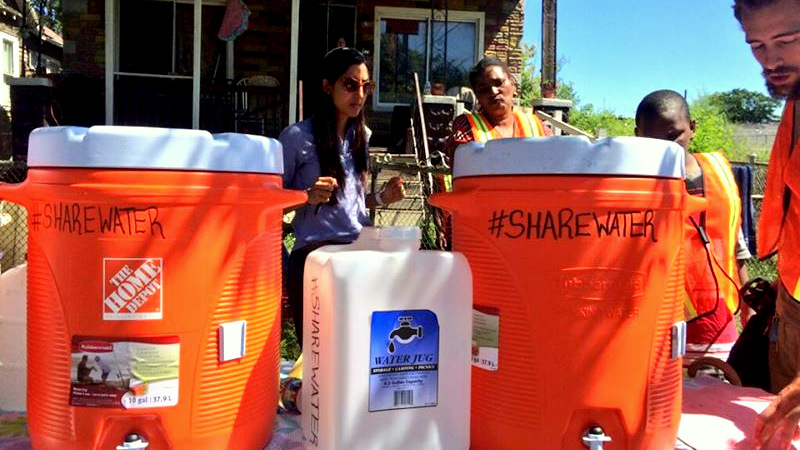 Detroit Water Brigade distribute in a Detroit neighborhood. (Photo: DWB Facebook Page)
Detroit Water Brigade distribute in a Detroit neighborhood. (Photo: DWB Facebook Page)
The city has made attempts at rehauling the payment options. However, Mayor Mike Duggan’s “10-30-50” plan has been criticized as inadequate. Residents start by paying down 10 percent of their debt while still paying their monthly bill. If they miss a payment, they have to pay 30 percent and then 50 percent of the balance. The water is shut off following a fourth missed payment.
Curt Guyette, an investigative reporter with the American Civil Liberties Union of Michigan, wrote last month:
“According to the most recent numbers provided by Detroit’s Department of Water and Sewerage, 24,743 residential customers are enrolled in a payment plan. Of that number, 24,450 are at least 60 days past due on their payments—meaning that their homes are in danger of losing water service once the city resumes shutoffs.
Stated another way, only 300 of the 24,743 customers put on the mayor’s payment plan were able to keep up with their payments and ensure their water will keep flowing.”
In response to calls from the U.N. and community groups such as the Detroit Water Brigade, the Michigan Welfare Rights Organization started a petition calling on President Barack Obama to intervene in the renewed shut-offs. The MWRO says the shut-offs are focused on “low-income families and have affected the homes of children, the disabled, and our honorable veterans.”
On May 4, the City Council of Detroit approved a resolution to consider the 2005 Water Affordability Plan before resuming the residential water shut-offs. The resolution could lead to a new affordability plan that works for more residents. Critics of the shut-offs are also calling for new income-based plans.
While the City Council considers the resolution, thousands of families have begun receiving notices that those who owe more than $150 or are more than 60 days behind on payments will have their water turned off within several days.
Williams says the city needs to begin considering new ways to forgive the debt, like community service. The Water Brigade will continue to help residents negotiate with the city as an estimated 15,000 more homes are slated for shut-off.
“What you are going to see this summer is more awareness, more direct action,” Williams told MintPress.
He’s emphasizes that the group and its 500 volunteers are not afraid to get their hands dirty when they need to. “We are going to block the trucks coming to turn the water off,” he said. “We are going to form ‘groups of angels’ to protect homes from shut-offs.”
“I am being progressive. I am being proactive. I am being professional,” Williams said with just a hint of frustration in his voice. “I am trying to be as diplomatic as possible, but if we are not being heard? Shut it down. Shut this city down if we have to.”
Is water a human right?
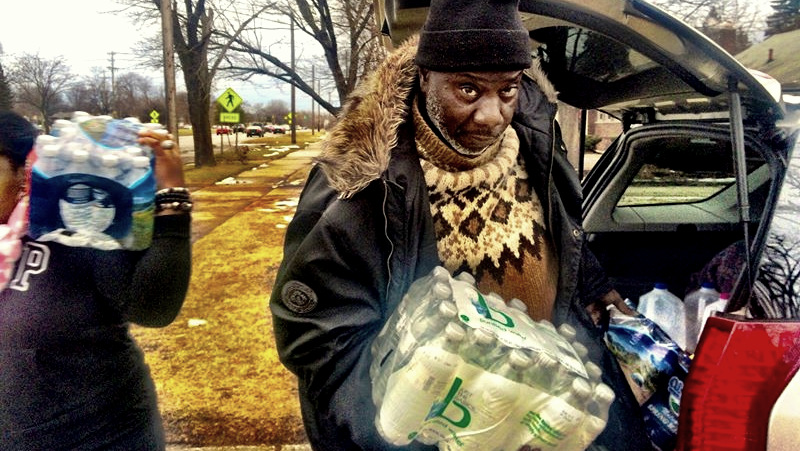 Detroit Water Brigade Senior Advisor Rodney ‘Radio RAHIM’ Deas volunteering to deliver water to the Eight Mile & Telegraph area. (Photo: DWB Facebook Page)
Detroit Water Brigade Senior Advisor Rodney ‘Radio RAHIM’ Deas volunteering to deliver water to the Eight Mile & Telegraph area. (Photo: DWB Facebook Page)
The discussion on the privatization of water is not exclusive to Detroit. Issues with water privatization extend not only to Ireland, but also to Sao Paulo, Brazil, and indigenous resistance in Ecuador. Even in the U.S., the city of Baltimore has shut off water to around 1,600 residents since last month — an effort to collect on $40 million worth of debt. And just like in Detroit, the poorest communities are being hit the hardest.
The Baltimore Sun reports that commercial businesses are allowed to continue to operate with delinquent accounts, while residents face disconnections. According to The Sun, over 350 large commercial accounts — which includes businesses, nonprofits and government offices — are responsible for $15 million in delinquent water bills.
While corporate entities are allowed to operate, families and individuals in Detroit are facing difficult choices. From the outside looking in, some individuals might ask why the people of Detroit don’t just pay their water bills. Some have even accused the residents of attempting to get a free ride.
Williams asks that critics reexamine their position:
“Detroiters paid their water bills. They were from $40 to $50 a month, now they are around $150 a month. Most people can’t afford that. You need to have compassion, have a heart.”
Williams remembers Detroit as a place of community and friendly neighbors. And it is precisely that sense of community which he believes will help the city rebuild as it struggles to take care of the remaining inner-city population.
Meanwhile, much of the debate around the water shut-offs revolves around the question of whether or not water is a human right. The way an individual answers that question determines the solutions he or she might put forth. Some argue that since water is essential to life it should be freely available to everyone at an affordable price, while others believe water privatization would lead to cheaper water, not an increase in prices as critics of privatization fear.
Again, Williams stresses compassion: “Who is anyone to deny another person water? Water is a fundamental human right.”
He also reiterates that his group is not calling for free water. He said, “Nobody asked for free water. We asked for affordable water so we can all enjoy this one source of life.”
How the situation will play out in Detroit remains to be seen, but one thing is certain: while the city is corporatized the working class suffers.
As for the Detroit Water Brigade, the organization continues to grow and garner international support. The group is now creating a spinoff community, the Detroit Workers and Builders union. The group’s co-founder Justin Wedes recently announced that he was resigning to head up the Workers and Builders union in an effort to put “homeless and low-income Detroiters to work fixing the city and its aging water system.”
Wedes says he is confident that the Detroit Water Brigade, under Williams’s leadership, will continue to provide a valuable service for Detroiters in their fight to provide water to those who are most vulnerable.


